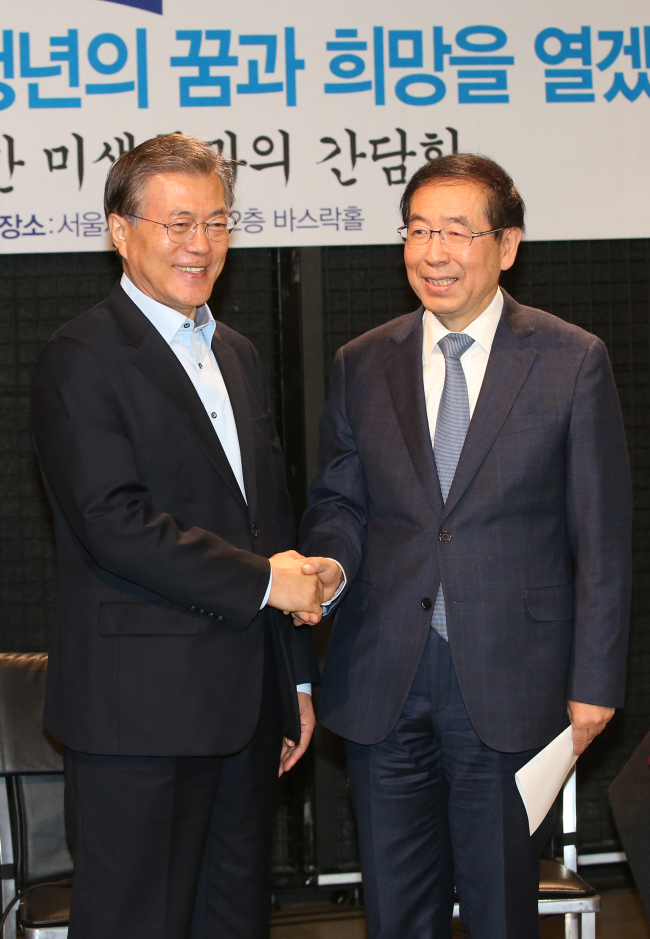Seoul Mayor Park Won-soon’s plan to provide cash benefits to unemployed young people has prompted political debate as the government slammed it as an unrealistic attempt to seek political gains.
While Finance Minister Choi Kyung-hwan on Thursday rebuked the move as “welfare populism” and pledged to block the policy, Seoul Mayor Park Won-soon vowed to push ahead with the scheme under the support of main opposition New Politics Alliance for Democracy leader Rep. Moon Jae-in.
“Some local governments are trying to implement new welfare policies that I believe are welfare populism. (The government) will exert its authority to prevent those localities from indiscriminately rolling out financial aid to the people,” said Choi during the meeting with Cabinet members who deal with economic policies.
 |
| Seoul City Mayor Park Won-soon(right) and NPAD Chairman Rep. Moon Jae-in. Yonhap |
Park and Moon, two main opposition political heavyweights, disputed the criticism, as they joined hands in working on overhauling the NPAD to win next year’s general election. They asserted that the localities are in a better position to provide tailored solutions to the worsening youth unemployment.
Pointing to the government’s repeated objection to the independent moves of local governments to implement their own welfare policies, the two NPAD presidential hopefuls urged the government to share its authority with localities.
“Since it has taken more than a year to come up with this policy, it is well tailored for the target group. I think the central government’s policy tends to be more standardized. (The central government) should grant more autonomy to local governments,” said Park in a meeting with young people at Seoul city hall.
The escalating feud came after Seoul City announced on Nov. 5 that it would offer 500,000 won ($430) a month to unemployed young people aged between 19 and 29 who are in the low income bracket. Seoul said it would implement the policy next year.
As a part of the city’s five-year youth support plan, the city of Seoul will select 3,000 unemployed young people the city deems to be eligible for the subsidy for up to six months. The young applicants are required to submit their job hunting plans.
The policy was thrown into the political limelight as the government raised its opposition. The Ministry of Health and Welfare asserted that the city violated relevant laws because it pushed to implement an “independent” welfare policy without coordination with the central government.
According to the Framework Act on Social Security, local governments must consult with the Welfare Minister in creating their own welfare system. In September, the city Seongnam and the Sungdong-gu district of Seoul had pursued similar policies for youth, but the plans had been thwarted by the central government.
Seoul City has refuted, saying the policy in question is not subject to consultation with the central government because it was not a welfare policy, but rather a program to boost youth employment.
Seoul also said their plans are different from previous ones as they would undertake a selection process to determine eligible beneficiaries, not indiscriminately roll out financial aid to those in need as Seongnam had intended.
If Seoul agrees to consult with the central government, they would have 90 days to discuss the plans. If the municipality refuses, the government has no legal options to block it. The government can instead cut financial assistance for the city.
Welfare experts expressed their regret over the politicization of youth employment, saying the welfare issues have often turned into ideological battles between liberals and conservatives, overshadowing those in need.
“In Korea, conservative and liberals often clash over whether welfare policies should be universal or specifically for a certain group of people,” said Chung Ick-joong, a social welfare professor at Ewha Womans University Graduate School of Social Welfare.
“Admittedly, one policy could be more important than the other depending on the situation. But usually we need both. It is a shame we often tend to use partisan ideology to attack a specific policy, without contemplating what is in the interest of the nation’s welfare policy as a whole,” said Chung.
The financial assistance program for the young unemployed people is not uncommon in some European nations. France offers cash benefits to young unemployed aged 18 to 26 who promise to take a one-year course for job hunting. Germany operates a similar program for helping young people pay for living expenses.
By Yeo Jun-suk (jasonyeo@heraldcorp.com)

